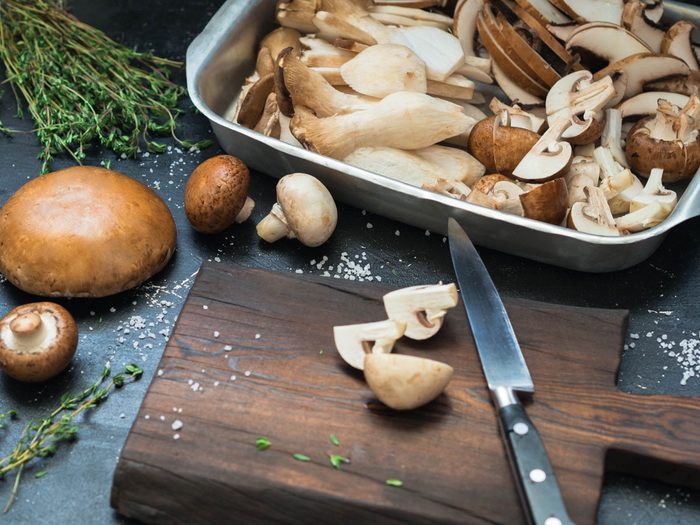
Mushroom nutrition
Many varieties of mushrooms contain good-for-your-bladder selenium and, like us, they produce vitamin D when exposed to sunlight. Oyster mushrooms are a good source or iron. Plus, they’re low in calories: Six medium white, for example, have just 22. Here are some of the many health benefits of mushrooms.

Increase your vitamin D
Yes, vitamin D! Mushrooms are the only fruit or vegetable source of this critical vitamin. Like humans, mushrooms produce vitamin D when in sunlight. Exposing them to high levels of ultraviolet B just before going to market converts more of the plant sterol ergosterol into the so-called sunshine vitamin. In the U.S., portobellos fortified with vitamin D are already being sold, with a three-ounce (85-gram) serving providing about 400 IU of vitamin D (Osteoporosis Canada recommends that adults under 50 get 400 to 1,000 IU daily). William Stevens, CEO of the trade organization Mushrooms Canada, says, “A couple of Canadian producers are already testing this procedure.” He adds that “high D” or “sunshine” mushrooms can be found in some stores. Watch out for signs you might be deficient in certain nutrients.
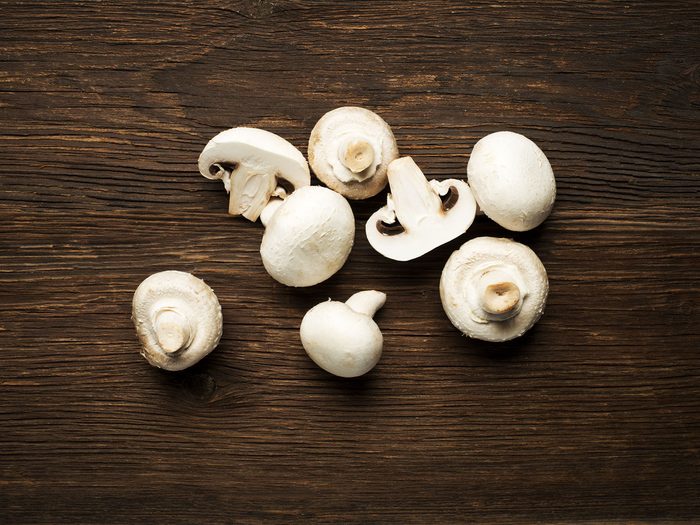
Boost your immune system
A study done on mice and published by the American Society for Nutrition found that white button mushrooms may promote immune function by increasing the production of antiviral and other proteins that are released by cells while they are trying to protect and repair the body’s tissues. A later study showed that these mushrooms promoted the maturation of immune system cells — called dendritic cells — from bone marrow. According to the researchers, these mushroom benefits may help enhance the body’s immunity leading to better defence systems against invading microbes.
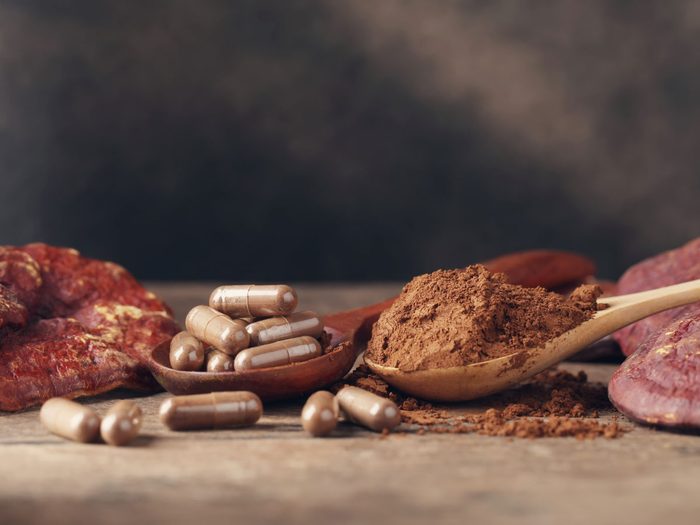
Improve gut health
If you experience digestive issues or could use a boot on your weight loss journey, consider turkey tail. This type of mushroom was proven in the International Journal of Molecular Sciences to be a prebiotic that can help stimulate the growth of our gut microbiota. Prebiotics are different from probiotics, but just as important.

Eat your antioxidants
When it comes to antioxidants — the substances that help fight free radicals that are the result of oxidation in our body — we’re more likely to think of colourful vegetables than neutral-hued mushrooms. But a study at Penn State university showed that the oxygen radical absorbance capacity (ORAC) — a measure of a food’s total antioxidants — of crimini and portobello mushrooms were about the same as for red peppers. Chaga mushrooms are also an antioxidant power-house, according to research from the The Journal of Bioscience and Engineering. This free-radical ‘scavenger’ may be an anti-aging secret weapon. Research also points to cellular protection benefits meaning it could have anticancer potential. Add to your morning smoothie for a super-clean start or try chaga tea.

Kick up your metabolism
B vitamins are vital for turning food (carbohydrates) into fuel (glucose), which the body burns to produce energy. They also help the body metabolize fats and protein. Mushrooms contain loads of vitamin B2 (riboflavin) and vitamin B3 (niacin): 100 grams (31/2 ounces) of crimini have 44 percent and 30 percent of your daily recommended amount, respectively, white button have 36 and 30 percent, and oyster mushrooms have 32 and 39 percent. Don’t miss these silent signs you’re not getting enough vitamin B12 from your diet.
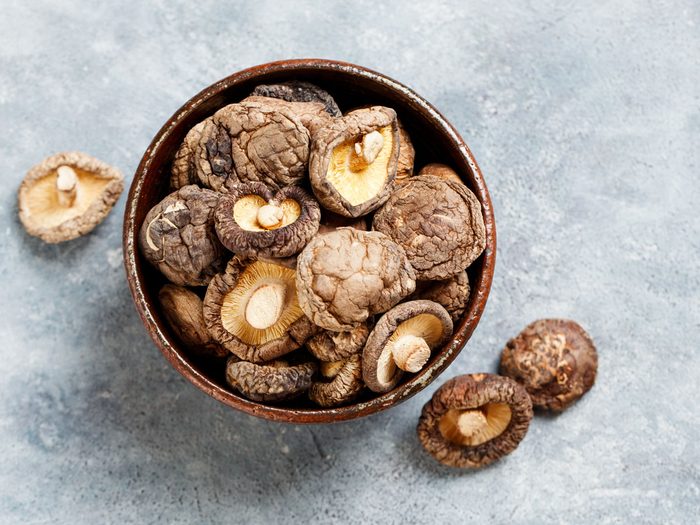
Be good to your bladder
An analysis of seven studies — published in Cancer Epidemiology, Biomarkers & Prevention — showed that the higher the level of selenium, as measured in blood serum and toenails, the lower the risk of bladder cancer. Selenium had a significant protective effect mainly among women, which the researchers believe may result from gender-specific differences in this its accumulation and excretion. When it comes to mushroom nutrition, many types are rich in this essential trace mineral: 100 grams of raw crimini have 47 percent of your daily needs, cooked shiitakes have 45 percent and raw white button have 17 percent.
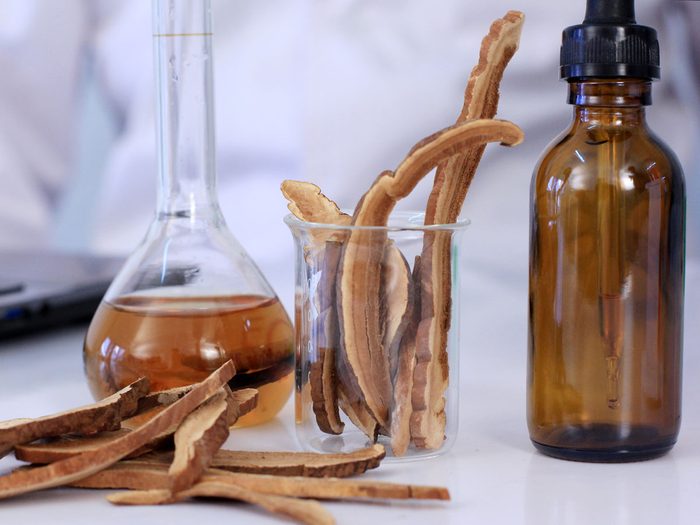
Manage stress
Reishi mushrooms have been called ‘nature’s Xanax’ due to their ability to help us manage stress. According to 2011 research from Herbal Medicine, Biomolecular and Clinical Aspects, reishi can help ease insomnia and help us make the most of our waking hours. Reishi mushrooms aren’t the type you sauté in a stir-fry. Instead you brew it into a tonic for a tea or cappuccino, like this Healing Reishi Cappuccino.
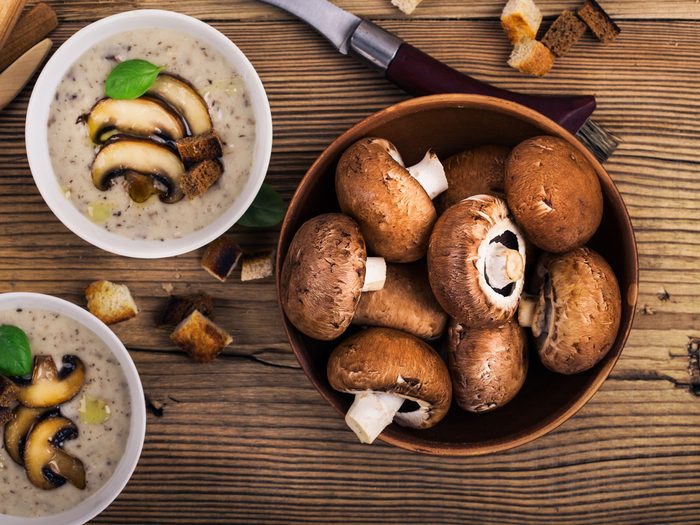
Increase energy
If you’re trying to break the cycle of caffeine spike and then crash, try cordyceps, which have been growing in popularity as an adaptogen. Where coffee simply stimulates the nerves and adrenals, research from the Journal of Alternative Complementary Medicine showed that cordyceps helps people struggling with fatigue by increasing energy levels and physical endurance naturally – without the crash.
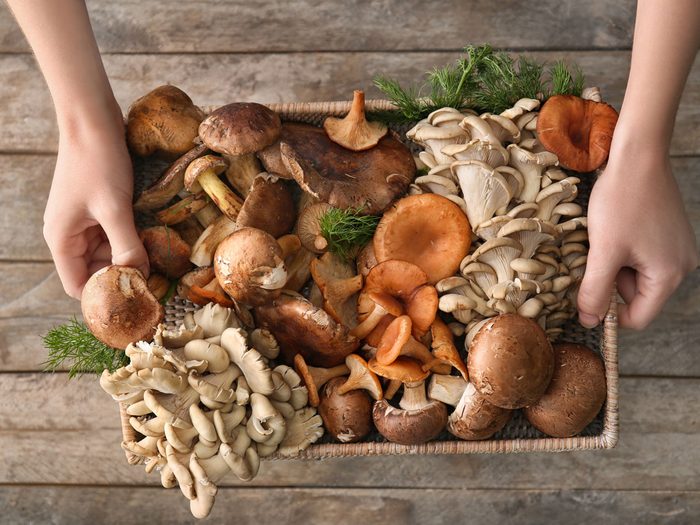
Boost focus and brain health
Lion’s mane mushrooms are a favourite among fungi fans for neuroprotective properties. 2018 research from Behavioural Neurology found lion’s mane to be effective in improving mild cognitive impairment in 50- to 80-year-old patients. Take it for increased daily focus – and your long term nerve and brain health.
Ready to start adding more mushrooms to your diet? We’ve gathered our best mushroom recipes all in one place.
